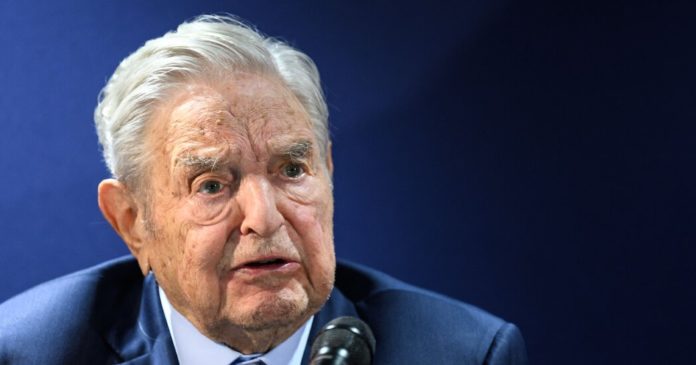For more than a quarter-century, from East Asia to Central Europe to the United States, the reclusive financier George Soros has been cast as a puppet master by conspiracy theorists, who have branded him as the man behind the curtains for crises as varied as currency collapses, immigration surges and general moral laxity.
Now, Mr. Soros, a billionaire and frequent donor to Democratic causes, has been credited by the American right with a new achievement: the indictment of Donald J. Trump.
The Manhattan district attorney, Alvin L. Bragg, was “handpicked and funded by George Soros,” the former president declared on Thursday as news of his indictment was breaking.
The descriptor “Soros-backed” was attached to Mr. Bragg’s name by Ron DeSantis, the Florida governor and potential White House rival of Mr. Trump; Representative Elise Stefanik of New York, a member of the House Republican leadership; Senator Rick Scott of Florida, the last head of the Senate Republican campaign arm; and Representative Marjorie Taylor Greene of Georgia, the far-right firebrand, as she traveled to Manhattan on Monday to protest Mr. Trump’s arraignment.
The right’s fixation with Mr. Soros has waxed and waned for years, but the tumult surrounding Mr. Trump’s indictment has given new life to what critics have long contended is a fixation tinged with antisemitic bigotry. Mr. Soros, a Hungarian Jew, survived the Holocaust, fled communism and became one of the single largest funders of democracy promotion, anti-Communism and liberal education around the globe.
“We understand that when someone makes comments about ‘Soros-backed prosecutors,’ that on its own is not necessarily antisemitic,” said Jonathan Greenblatt, chief executive of the Anti-Defamation League, a Jewish civil rights group.
“But when a person or a political party repeatedly and relentlessly makes wild claims such as that there is a ‘cabal of globalists backed by Soros destroying our country,’” Mr. Greenblatt said, “that is invoking a classic anti-Jewish conspiracy theory, and it should be condemned.” Mr. Trump and his allies have singled out Mr. Soros for years, Mr. Greenblatt added.
The remarkable dexterity of Mr. Soros’s supposed power has only added to the surreality of his critics’ charges. In 1997, the prime minister of Malaysia blamed the financier for his nation’s economic collapse. The now-disgraced former House speaker, J. Dennis Hastert, suggested that Mr. Soros’s efforts to counter George W. Bush’s re-election bid in 2004 may have been financed by “drug money.”
The Hungarian leader Viktor Orban has made Mr. Soros his go-to villain in pursuit of what he calls “illiberal democracy” — an all-purpose scapegoat whenever his government faces a crisis it can’t handle.
Antisemitism in America
Antisemitism is one of the longest-standing forms of prejudice, and those who monitor it say it is now on the rise across the country.
Mr. Orban first discovered Mr. Soros’s potential as a politically useful enemy during Europe’s 2015 migrant crisis. That is when Mr. Orban accused nongovernmental organizations funded in part by Mr. Soros of encouraging desperate people from Africa and the Middle East to pour into Hungary as part of a plot to dilute the native population and to provide a pool of future liberal voters.
This message, blasted at high volume to voters by Mr. Orban’s media machine, became the centerpiece of his Fidesz party’s campaign ahead of a general election in 2018. Billboards went up across the country featuring pictures of the financier smiling and the slogan: “Let’s not let George Soros have the last laugh.”
Fidesz proposed a so-called Stop Soros bill to ban organizations judged to support migration and also to tax groups receiving foreign funding — a bill aimed less at halting migration than at curbing the influence of civil society groups viewed as hostile to Fidesz.
The indictment of Mr. Trump has re-centered Mr. Soros in American politics — and rekindled the debate over whether criticism of a Democratic megadonor who is Jewish can be labeled bigotry. Mr. Soros, after all, has hit back at Mr. Trump, too.
How Times reporters cover politics. We rely on our journalists to be independent observers. So while Times staff members may vote, they are not allowed to endorse or campaign for candidates or political causes. This includes participating in marches or rallies in support of a movement or giving money to, or raising money for, any political candidate or election cause.
In February, at a rare public address at the annual Munich Security Conference in Germany, Mr. Soros called the former president a “confidence trickster whose narcissism grew into a disease.” Mr. Soros went on to predict that Mr. Trump would lose the Republican nomination, run as a third-party candidate and provoke a landslide victory for the Democrats.
The conservative columnist Charles C. W. Cooke argued strongly in The National Review that Mr. Soros’s active involvement in politics, including the push to elect liberal district attorneys like Mr. Bragg, makes him fair game, and that charges of antisemitism are out of line.
“This is America,” he wrote. “In free countries, free people are allowed to argue for whichever sort of elected officials they prefer. And in return, other free people are permitted to criticize them.”
Mr. Soros’s involvement with Mr. Bragg’s election is indirect. In 2021, during a heated Democratic primary, the political arm of the self-described racial justice organization Color of Change pledged $1 million to support Mr. Bragg’s campaign. Shortly afterward, Mr. Soros gave the organization a $1 million gift, one of several donations that he gave to the group totaling about $4 million since 2016. While Mr. Soros declined an interview request, a spokesman for Mr. Soros said that the financier and the Manhattan district attorney had never met, and that no contributions to Color of Change were earmarked for Mr. Bragg when he was a candidate.
Additionally, Color of Change’s political action committee, which must stay independent of political candidates it endorses, did not meet its pledge of support to Mr. Bragg, spending about half of its promised $1 million.
“I think some on the right would rather focus on far-fetched conspiracy theories than on the serious charges against the former president,” Mr. Soros said in a text to the news organization Semafor.
Mr. Soros’s influence on liberal politics is just as complicated. His 2021 donation of $125 million to his own political action committee, Democracy PAC II, made him by far the largest donor of the 2022 midterms. But the PAC spent only a fraction of that money, about $11 million, more than half of which went to one organization, the Senate Majority PAC, the Democrats’ semiofficial super PAC funding the party’s efforts to hold the Senate.
“He’s typically at or near the top, but in ’22, the money he gave went nowhere,” said Sheila Krumholz, executive director of OpenSecrets, a nonpartisan campaign finance research group in Washington. “It’s almost misleading to call him the top donor because he had almost no impact on the cycle.”
But his impact on political discourse has been outsize. Senator J.D. Vance of Ohio and Representative Anna Paulina Luna of Florida, both freshman Republicans, accused Mr. Soros of buying Mr. Bragg. The Anti-Defamation League pointed to social media posts on the far right that amplified such claims and that also jumped into open antisemitism, with claims like, “‘Jews don’t run the world.’ Meanwhile George Soros just got President Trump indicted.”
The ADL noted that dozens of fund-raising emails sent by the Trump campaign have mentioned Mr. Soros, using what the group called “explosive language” like “puppeteer” or “puppet master.”
“In any context, such language would be alarming,” Mr. Greenblatt said. “At a time when antisemitism in America has reached historic levels, this behavior isn’t just disturbing; it is indisputably dangerous.”
Rashad Robinson, the president of Color of Change, called the attacks on his organization both antisemitic and racist, since they cast a Harvard-trained prosecutor as a stooge controlled by a Jewish billionaire.
The attacks have had an impact, he said. Funding for criminal justice reform groups was drying up as the issue became more partisan, he said. Now his group is spending money on security, monitoring threats on the internet and watching allies maintain their distance.
“It’s scary, and it’s tough, and it’s challenging,” Mr. Robinson said.
Conservative commentators say such claims are meant to shut down legitimate debate on the overreach of liberal, partisan prosecutors.
The same argument has roiled Hungary, where some critics of Mr. Orban, appalled by the anti-Soros billboards, accused the Hungarian leader of deploying a common antisemitic trope, the “Laughing Jew.” Others believe that Mr. Orban’s demonization of the financier is rooted less in bigotry than in a broader, politically expedient hostility to wealthy liberal elites, no matter what their ethnicity or faith.
Mr. Soros, at nearly 93, does not speak publicly as much as he once did, but in Munich, he appeared to understand the irony of his desire to shape world events without unduly altering reality. It is that shaping of events that has invariably infuriated his detractors.
“As participants we want to change the world in our favor,” he said. “As observers we want to understand reality as it is.”
“These two objectives,” he added, “interfere with each other.”
Source : Nytimes













